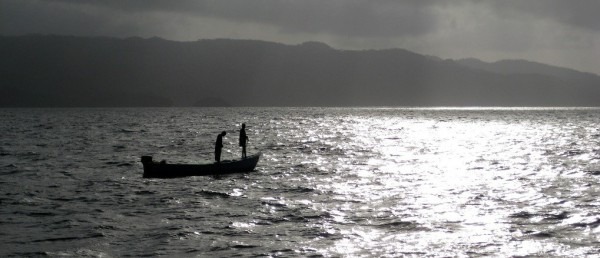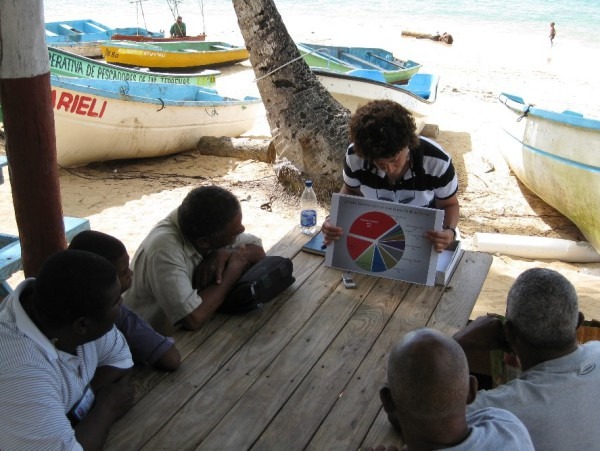As a social-ecologist, I have been learning from fishers the local ecological knowledge they have and how they relate to their environment and the changes that they live. Fishers’ local ecological knowledge is not only vast, but it is set on a continuum, capturing changes and many more complexities. Learning from the fishers not only moves us towards validation and building trust with them as vested local stakeholders, but truly expands the base of the knowledge we need, enabling us to see the full picture. We need to turn many current coastal management programs into effective conservation tools! Without doubt, as we move towards a more integrated and/or co-managed fisheries practices, our future societies will ask: “What took us so long?”
In my efforts to learn from fishers and pass along their knowledge, I have turned to scientific storytelling as an invaluable tool for communicating my work in a meaningful and engaging way.
One fall in Denver, an engineer and his nine year old daughter were presenting traditional stories during one of the closing sessions at the American Science and Engineering Society Conference; their natural delivery and play delighted the audience, their dialogue and content left us all with something to reflect upon. It was a packed room and we had been listening to talks for 3 days, yet we found ourselves renewed and engaged, as well as entertained.
I was still thinking about this talk when I met a young researcher in Boston. This scientist had circumvented the challenge of writing his dissertation by relying on the principles of storytelling. As he uncovered his own method, he also made this readily available to others (See: The Art of Scientific Storytelling).
I believe that as scientists communicating our knowledge is just as important as the research work in itself. We are trained to write scientifically and to deliver results following defined standards and conventions. Different from this, the great level of engagement that I saw in Denver and the innovative method I was learning from the researcher in Boston were exactly what I wanted to do and promote. Over the weeks that followed, I plotted to connect with the engineer, and the researcher, to consult with them on how we could together promote storytelling in the sciences.
I was already excited about this new arena when I learned about the Scientific Storytelling workshop that was to be offered before the International Marine Conservation Congress (IMCC 2014). Without having the tools, I was turning my research presentation into a story, and sharing it with friends who listened to my practices and found that they could relate to my work because of how it was presented.
Taking part in the workshop, I learned the tools, concepts and techniques for transforming research into a story. Parallel to this learning opportunity, the teachers built a trusting and nurturing community upon which we could fall back on. After the IMCC conference, I continued to travel and I continued to share my story. Presently, I continue to think of research and writing in terms of communicating at a different level, I believe that using the principles of storytelling is a powerful tool. My desire to learn and improve how we communicate science has pushed me to explore new horizons…you might even spot me at the local theater where I continue to learn more.

In the interest of fisheries conservation and integrated management programs, we are turning to local stakeholders to learn from them. The story I presented last year at the International Marine Conservation Congress (IMCC 2014) is about how I learned the meaning of the fishers ‘Far out’ in the context of coastal fisheries and the changes that these fishers live. The scope of this scientific storytelling is to unwrap a scientific finding – a mystery – and to share it with the world in an engaging way.
Although this story is about a fisher, this story could well be about you, or your neighbor whose commute to work is longer today than it ever was. Think about the time he or she spends commuting to work, then think about how much time he or she will have left to be at home.
‘Far out!’ said the fisher…
Sitting along the coast watching the tide wash in and out was the site of many interesting conversations. How I learned from them, and how their stories, became my stories. I wonder if you will be thinking about my friend the fisher next time you commute to work, or the next time you are buying fish, will you too think and say these very words ‘Far out!’
Elizabeth Mclean is currently pursuing her PhD in Environmental Sciences from the University of Rhode Island (URI) and working as an affiliated scientist in the Coastal Research Center at URI
Further Reading
Cinner, Joshua E., et al. “Co-management of coral reef social-ecological systems.” Proceedings of the National Academy of Sciences 109.14 (2012): 5219-5222.
Lubchenco, J., 1998. Entering the Century of the Environment : A New Social Contract for Science. , 279(January), pp.491–497.
Neis B., D.D. Schneider, et al. 1999. Fisheries assessment: what can be learned from interviewing resource users? Canadian Journal of Fisheries & Aquatic Sciences 56:1949.
Wilson D.C., J. Raakjær, et al. 2006. Local ecological knowledge and practical fisheries management in the tropics: A policy brief. Marine Policy 30(6):794-801.
MAHB-UTS Blogs are a joint venture between the University of Technology Sydney and the Millennium Alliance for Humanity and the Biosphere. Questions should be directed to joan@mahbonline.org
The views and opinions expressed through the MAHB Website are those of the contributing authors and do not necessarily reflect an official position of the MAHB. The MAHB aims to share a range of perspectives and welcomes the discussions that they prompt.
